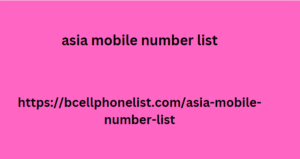As a copywriter, I celebrate the efficiency and beauty of language every day. Not even specifically the Dutch language, but the concept of language. Without language, I would have had to introduce myself to you with gestures and throat sounds. Maybe there would have even been some curious sniffing involved (in places where you probably don’t want to find anyone’s nose). However, thanks to the miraculous tool called language, I can simply say: ‘Hi, I’m Vincent.’ You see: there are no monkey sounds involved, and sniffing is also unnecessary.
In case you haven’t figured it out yet, this article is about language. (Or la lingua , as the Italians say; språket as the Swedes call it, also η γλώσσα to our Greek fellow human beings.) The most beautiful words in the world served up on a plate.
Language is practical and beautiful
That language is practical is evident from this. Language Contact: robinsonwilfred gmail com phone number database Building Our 100% Accurate Consumer Phone Database The information you need for your asia mobile number list telemarketing assignments will not be easy to acquire if it were just as simple as setting up a computer and accessing the internet. Our phone number database | We are providing COMBO packages and SINGLE Packages of Latest Fresh Databases To get those please Contact us| 24/7 Customer Support ◥ Are you Saying, You can do your own Business just by doing campaign with our same Data base. So, our databases are from and taken through database quality or quantity permissioned sites. makes life more efficient. Speech and language are important reasons why we as humans have become the most dominant species on earth.
But there is more than a purely practical aspect when it comes to language. Language can also be beautiful. That is why we recite Goethe and read Murakami. Why woolly love letters are sent between lovers. And why storytelling is a booming business.
The versatility of language
Conclusion: language has both a practical aspect and an aesthetic effect. It is this versatility of the written word that I celebrate daily as a copywriter in Antwerp. How? By respecting language. By avoiding language errors and writing original texts. And also: by using the many possibilities of language.
Because how many words are there in the world? The Dutch language alone has countless words. The Grote Van Dale contains 240,000, but by compounding words you can create endless new combos: ‘huismijt’ and ‘probleem’ become ‘huismijtprobleem’; ‘huismijtprobleem’ and ‘oplossing’ makes ‘huismijtprobleemoplossing’. These words are not in a dictionary, but are perfectly correct.
I want to show you what I think are the most beautiful words in the world. I am not going to limit myself to the Dutch language; that would be a missed opportunity. After all, there is so much beauty in the world. Who knows, you and I might even enrich the Dutch language. If we use our favorite foreign words often enough, they might become loan words. After all, words like überhaupt, cool, marketing, panini, croque monsieur and alfabet once crept into the Dutch language as newcomers. And now we find them completely normal.
The most beautiful words in the world
I won’t delay any longer. These are (in my humble opinion) the 25 most beautiful words in the world:
1. Love — because love conquers all. In Dutch, by the way, much more beautiful than in English ( love ligt te licht op delippen) or German ( Liebe is te hard).
2. Winterkill — an English word meaning ‘killed by winter’. It’s a morbid word, but oh so beautiful. And untranslatable too. If I ever start a metal band, I’m calling it Winterkill.
3. Muttermal — what is called birthmark in English and moedervlek in Dutch, is called Muttermal in German . The initial rhyme of the two parts sounds delightful to the ears.
4. Passion — the word passion sounds passionate. Passion also works well in other languages: passion in French, English and German; passione in Italian. Who doesn’t love a little passion?
5. Tickety-boo — This English word means “all right” or “as it should be”: “Everything is tickety-boo.” It either comes from the way children talk, or it comes from Hindi: “Tikai babu” means “Everything is all right, sir.”
Farfalla — of all the translations of ‘butterfly’, I like the Italian farfalla the best. Admittedly, farfalla sounds much better than butterfly , Schmetterling or borboleta . (Although I also find the Low Saxon word penne Voegel to have a certain charm.)
10. Sloddervos — according to a dictionary of proverbs from 1726, a sloddervos is the brother of a slob and the son of a slut. I think sloddervos is a wonderful word, because ‘slodder’ sounds so wonderfully dirty, exactly what suits the brother of a slob and the son of a slut.
Hijsbakkie — this is Afrikaans for lift. What I like about hijsbakkie is how unreliable the word sounds; it makes you think of a wooden orange crate being lifted up by kite string.
Spookasem — another Afrikaans one. Spookasem means ‘candy floss’. The breath of a ghost, that’s what it means. Cool word. (By the way, I also like ‘candy floss’.)
Photo source: Satoshi Hirayama on pexels
Koldskål — a Danish buttermilk drink. Why is this word so cool? At first glance it sounds gross (puke-kaal?), but when you look closely it means “cold bowl.” All the dirt just slides off the word and you’ll immediately want a glass (or bowl) of koldskål , a popular dairy drink in that small, super-friendly Northern European country.
14. Schwung — few words have as much schwung as the word schwung. I prefer to use schwung daily, and if necessary at completely random moments: “Honey, you can pass me that toothpaste with a little more schwung” or “That’s right, officer, that woman robbed me of my self-esteem with a particularly great schwung”. Too bad schwung is no longer in schwung for most people.
15. Onomatopoeia — Children’s language: a toot is a car, a waf is a dog, a meow is a cat. These are examples of onomatopoeia: figures of speech in which you imitate a sound with non-existent words. Interesting fact: a cat is actually a māo (貓/猫) in Chinese .
16. Parallelepiped — to quote my trusty third-brain Wikipedia: “A parallelepiped or cuboid is a polyhedron with six parallelograms as faces, eight vertices, and twelve edges, of which all opposite faces are parallel and, when viewed from the outside, are mirror images of each other.” Is it important to know what a parallelepiped is, though? No. All you need to know is that such an incredible word exists.
17. Hygge — a Danish word that has no English translation and is pronounced as ‘huuge’. With this word the Danes describe a special atmosphere. We could say that it comes close to ‘gezelligheid’. Hygge is one of the most important expressions in Denmark. Drinking a glass of koldskål together is considered very hygge .
18. Sunglow — when I say this word I immediately feel the warm sunglow on my skin. Because of the association with a warm summer day I find this a wonderful word. I especially think of it when it is February and I have not seen the sun for three months.
Thanks, Patrice, for this interesting addition!
19. Lavender — a purple flower with an incredibly delicious scent. Lavender is one of those words that sends the mouth into a state of ecstasy when you say it. Just try it. Ecstasy, really.
20. Cliché — a short but powerful word with a cool sound. Applicable in many languages: English, Dutch, French, Italian, Polish and Spanish. This makes it easy to learn languages.
21. Petricor — this is the Spanish word for that special, wonderful smell of rain hitting the ground. You know it. Just an addition: in February 2021 I was emailed by reader Patrice van Oostaijen, who pointed me to the Limburg equivalent: zwaai (sometimes also spelled zwaj ). Patrice told me she knew this word from the song De Peel in Brand by Rowwen Hèze:
You smoke the asphalt and the wave
If it has just responded
Photo source: Osman Rana on Unsplash
22. Баюкать — pronounced ba-yu-kat. Russians use this term to describe the act of rocking a baby to sleep in its crib or in its mother’s arms. The word’s origins are linked to a verb no longer used in modern Russian, баять, which means “to tell meaningless stories” or “to sing meaningless songs.”
23. Sjottelsplak — if your Limburg mother-in-law ever calls out to you, “The sjottelsplak licks naeve den durchslaag,” you know where to look for the dishcloth: next to the colander. Other Limburg words you should start using today: blaubaere (blueberries), sjmouwer (sandwich) and floepschieter (squirrel).
24. Kastan — you think Polish is a language that has nothing in common with Dutch? Yet you can easily discover the word kastanje in kastan . However, this Germanic influence on the Polish language is not due to the Flemish or Dutch: it is the German language that has given many words to Polish. For example, Polish has the words burmistrz (derived from Bürgermeister ), sznur (from Schnurr , or a rope) and plac (from Platz , a square).
25. Born — the beauty of this word is that it is a verb for which there iran phone number buy database is no present tense. In every situation you use it as a past participle: ‘The child is born.’ You will never hear anyone say: ‘That child is being born at the moment.’ (It sounds even stranger to say: ‘The child is being born at the moment.’) The word ‘born’ fascinates, and in this element of fascination there lies for me a great beauty.
But why, Vincent, why?
A blog out of love for languages; it was about time I wrote it.
Yet I think that it is not only writers, linguists and other literalists ao lists who understand how important language is. Language is what distinguishes us, humans, together with the characteristic that we laugh, from animals. It has enabled us to make it clear with minimal effort that the dishcloth is next to the colander. Or that a slob is eating spookasem in a hoist and thinking passionately about a delicious koldskål. (Just imagine having to convey such complex messages with gestures and primitive throat sounds!)
But the blessing of language use goes even further, especially for you
Beautiful, stimulating, interesting words ensure that your company can distinguish itself from the large gray mass. Well-chosen words build brands, poorly chosen words break brands.
I hope that this modest article, written for a modest Belgian website, has made someone, somewhere on earth, realize that language is not a piece of cake.

